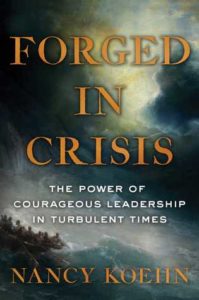
All these leaders were made. They were not born.
This book was given to me by my great friend, Greg DePriest. Upon receiving it, I moved it to the top of my reading list. This is the best leadership book I have read in several years. It is more than a modern repackaging of the same cliche materials that have been circulated and recirculated over and over again for the last 2 decades.
Forged in Crisis is a collection of 5 short stories. The heroes are shown in their humanity with intriguing insight into their triumphs and struggles.
One quote that particularly resonated with how I often feel came from Bonhoeffer:
“It is strange that in all my decisions, I am never completely clear about my motives. Is that a sign of lack of clarity, inner dishonesty, or is it a sign that we are led beyond that which we can discern, or is it both?” – Bonhoeffer
The leaders showcased are:
- Earnest Shackleton – an arctic explorer
- Abraham Lincoln – a strategic politician
- Frederick Douglass – an educated slave
- Dietrich Bonhoeffer – a loyal preacher
- Rachel Carson – a gifted scientist
Some quotes noted through my reading were:
- The Call of History
- The concept that, at times, the most powerful thing one can do is invest in oneself, without signs of great outward progress, is another that is difficult of us to grasp today.
- All these leaders were made. They were not born.
- The harder they worked on themselves, the more effective they became as leaders.
- Ernest Shackleton
- Individuals in positions of authority must learn to embody their mission not only in what they say and do, but also in how they show up.
- Hire for attitude, train for skill.
- “I realised the loneliness and penalty for leadership” – Shackleton
- Abraham Lincoln
- The ability to experience negative emotions without falling through the floorboards of doubt is a vital lesson for today’s leaders. Even in the face of great obstacles, individuals must learn to maintain their equanimity while trying to advance their cause.
- He had to shape his methods to changing circumstances without giving up his ultimate goal; he then had to move forward into the consequences of these choices.
- Keeping his emotions in check and allowing his rivals some latitude to alter their actions was a useful strategy.
- Leaders trying to accomplish a worthy mission have to cultivate the ability to identify the one, two, or three essential issues facing them at a given moment. It is never five or ten. It is always one or two – maybe three – issues that really matter.
- “I hope to have God on my side, but I must have Kentucky.” – Lincoln
- Frederick Douglass
- “Knowledge unfits a child to be a slave.” – Douglass
- All individuals who aspire to lead effectively must build their own foundation.
- This is an essential lesson to anyone who yearns to lead. The temptation, especially in times of discouragement and failure. is to leap into the first opportunity that comes our way, to do something – anything – that may advance our mission. But this is not, as Douglass realized, right action for leaders. Right action requires taking a long pause and considering how one can do the most good. This always entails putting one’s gifts and experience to their best use.
- Dietrich Bonhoeffer
- “It is strange that in all my decisions, I am never completely clear about my motives. Is that a sign of lack of clarity, inner dishonesty, or is it a sign that we are led beyond that which we can discern, or is it both?” – Bonhoeffer
- “Obedience to God’s will may be a religious experience, but it is not an ethical one until it issues in actions, which can be socially valued.” – Reinhold Niebuhr
- “Great changes in the course of world history are before us.” – Bonhoeffer
- “Who can really be faithful in great things, if they have not learned to be faithful in the things of daily life?” – Bonheoffer
- Bonhoeffer sought a God at the center of everyone’s life, a divine power who spoke to men an women in their strength rather than in their weakness, who dealt in life and goodness rather than death and guilt.
- Biblical faith is not focused on man’s salvation after death, but rather on man’s life on earth – “not on withdrawal from the world but on engagement with its life, not on asceticism but on a genuine appreciation of the body and sexuality, not on private piety but on engagement with the world.” – Bonheoffer
- “I believe it is better to know for what one dies than not to know what exactly one is living for.” – Christine Dohnanyi
- Rachel Carson
- “The obligation to endure gives us the right to know.” – Jean Rostand
- Conclusion (learnings from the 5 leaders)
- All five leaders were willing to work on themselves.
- The five leaders discovered three additional insights in the crises they faced:
- The need to slow down and forbear reacting in the immediacy of a particular moment. “Make not haste in time of trouble” – Ecclesiasticus (KJV)
- The significance of committing to a worthy goal.
- The value of resilience.
- The power of writing and writing well.
- The ability to see the big picture and envision the potential impact.
- Attention these leaders paid to small details.
- Humility that came with having endured and learned from crisis.
